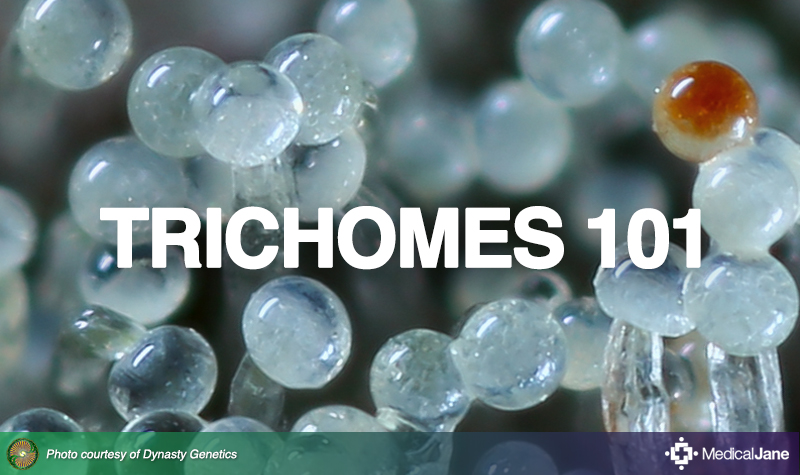Browsing Cannabinoid Science
ShareTweet
Cannabis Plant Anatomy: Trichomes 101
What are trichomes? If you look closely at a healthy cannabis plant, then you will undoubtedly notice the many glistening translucent resin glands protruding from the buds. These resinous outgrowths are known as trichomes. “In addition to housing the essential compounds of the Cannabis plant, trichomes play an important role in the survival of the plant.” Trichomes house the key components of the plant that give it its therapeutic and psychotropic properties. These glandular structures are predominantly responsible for the biosynthesis of cannabinoids, the biologically active compounds unique to the Cannabis plant. Barely visible to the naked eye, trichomes …
Which weed strain has the most THC?
Good evidence shows that a strain name is not a clear indicator of chemical composition in a given cut of medical marijuana, thus it cannot be used as an indication of potency. THC content can vary greatly strain by strain and even in batches with the same strain name. In some cases, the level of THC can be 5 times higher in the highest sample compared to the lowest sample, most likely as a result of cultivation conditions and slight genetic differences. Click here to learn more MANTIS_RECOMMEND = { property: '53422cdc8e92f89afbf09d5f', render: 'mantis__recommended__wordpress' }; var …
What are endocannabinoids?
Endocannabinoids are endogenous-fatty-acid cannabinoids produced naturally in the body (e.g., anandamide and 2-AG). Click here to learn more. MANTIS_RECOMMEND = { property: '53422cdc8e92f89afbf09d5f', render: 'mantis__recommended__wordpress' }; var z = document.createElement("script"); z.type = "text/javascript"; z.async = true; z.src = "//static.mantis.marketing/recommend.min.js"; var s = document.getElementsByTagName('head')[0]; s.parentNode.insertBefore(z, s); …
What is a phytocannabinoid?
Phytocannabinoids are cannabinoids that are concentrated in the oily resin of the buds and leaves of plants such as cannabis (e.g., THC and CBD). Click here to learn more. MANTIS_RECOMMEND = { property: '53422cdc8e92f89afbf09d5f', render: 'mantis__recommended__wordpress' }; var z = document.createElement("script"); z.type = "text/javascript"; z.async = true; z.src = "//static.mantis.marketing/recommend.min.js"; var s = document.getElementsByTagName('head')[0]; s.parentNode.insertBefore(z, s); …
What is THC?
Δ9-tetrahydrocannabinol (THC) is the most abundant cannabinoid present in medical marijuana. It is responsible for cannabis’ most well-known psychoactive effects. THC acts as a partial agonist at the CB1 and CB2 receptors. The compound is a mild analgesic, or painkiller, and cellular research has shown that it has antioxidant activity. THC has been linked to a measurable improvement in symptoms related to Tourette’s disorder, glaucoma, Crohn’s disease, chronic pain, arthritis, among others. THC has also been used to promote a healthy appetite in patients suffering from eating disorders, AIDS and patients undergoing chemotherapy. Click here to …
Does THC in cannabis help treat HIV symptoms?
Medical marijuana has long been used to treat symptoms associated human immunodeficiency virus (HIV) including chronic pain, nausea, fatigue, and more. However, evidence is mounting that cannabis may stop the progression of the disease altogether. A group of researchers from Louisiana State University published a study in early 2014 in the journal of AIDS Research and Human Retroviruses that helps fuel the fire. Their findings suggest that cannabis, specifically tetrahydrocannabinol (THC), could aid in the battle against HIV. Click here to learn more. MANTIS_RECOMMEND = { property: '53422cdc8e92f89afbf09d5f', render: 'mantis__recommended__wordpress' }; var z …
What is THCA?
THCA is also known as tetrahydrocannabinolic acid or 2-COOH-THC. THCA is the main constituent in raw cannabis. THCA converts to Δ9-THC when burned, vaporized, or heated at a certain temperature. THCA, CBDA, CBGA, and other acidic cannabinoids hold the most COX-1 and COX-2 inhibition, contributing to cannabis’ anti-inflammatory effects. This cannabinoid also acts as an antiproliferative and antispasmodic. Click here to learn more. MANTIS_RECOMMEND = { property: '53422cdc8e92f89afbf09d5f', render: 'mantis__recommended__wordpress' }; var z = document.createElement("script"); z.type = "text/javascript"; z.async = true; z.src = "//static.mantis.marketing/recommend.min.js"; var s = document.getElementsByTagName('head')[0]; s.parentNode.insertBefore(z, s); …
What is THCA in cannabis good for?
Not only does tetrahydrocannabinolic acid (THCA) have anti-proliferative abilities that are crucial in helping inhibit the growth of cancerous cells, but THCA also has anti-spasmodic attributes that helps subdue muscle spasms. However, unlike THC, THCA does not produce a “high” feeling as it has not yet been decarboxylated. This makes cannabis strains high in THCA popular choices among many epileptic and pediatric patients. Click here to learn more. MANTIS_RECOMMEND = { property: '53422cdc8e92f89afbf09d5f', render: 'mantis__recommended__wordpress' }; var z = document.createElement("script"); z.type = "text/javascript"; z.async = true; z.src = "//static.mantis.marketing/recommend.min.js"; var s = document.getElementsByTagName('head')[0]; …
How does THCA work?
Once the cannabis plant is exposed to heat (when smoked or vaporized), tetrahydrocannabinolic acid (THCA) decarboxylates to THC. This explains why THCA is more active when someone juices the cannabis plant in its raw form than it is when medical marijuana is heated/smoked. Click here to learn more. MANTIS_RECOMMEND = { property: '53422cdc8e92f89afbf09d5f', render: 'mantis__recommended__wordpress' }; var z = document.createElement("script"); z.type = "text/javascript"; z.async = true; z.src = "//static.mantis.marketing/recommend.min.js"; var s = document.getElementsByTagName('head')[0]; s.parentNode.insertBefore(z, s); …
What is THCV good for?
Tetrahydrocannabivarin (THCV) has been shown to reduce tremors associated with diseases such as Parkinson’s, along with ailments associated with motor control. THCV stimulates bone cell growth, and has potential in the treatment of osteoporosis. It has also been found to reduce or even block panic attacks, making THCV highly effective in the management of PTSD and other mental disorders involving anxiety or stress. Click here to learn more. MANTIS_RECOMMEND = { property: '53422cdc8e92f89afbf09d5f', render: 'mantis__recommended__wordpress' }; var z = document.createElement("script"); z.type = "text/javascript"; z.async = true; z.src = "//static.mantis.marketing/recommend.min.js"; var s = document.getElementsByTagName('head')[0]; s.parentNode.insertBefore(z, s); …
